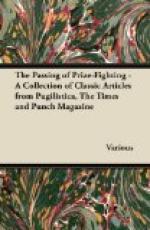And after each piece of advice the little Tridges would all say, “Right-O!”
And then one night—these being English Tridges in an English early summer—a terrible frost set in which lasted long enough to kill the whole covey, partly by cold and partly by starvation, so that all the good counsels were wasted.
But on the chance that one or two of them may be applicable to human life I have jotted them down here. One never knows which is grain and which chaff until afterwards.
* * * * *
=OUR BOOKING-OFFICE.=
(By Mr. Punch’s Staff of Learned Clerks.)
We have had many studies of the War, in various aspects, from our own army. Now in My .75 (HEINEMANN) there comes a record of the impressions of a French gunner during the first year of fighting. It is a book of which I should find it difficult to speak too highly. PAUL LINTIER, the writer, had, it is clear, a gift for recording things seen with quite unusual sharpness of effect. His word-pictures of the mobilisation, the departure for the Front, and the fighting from the Marne to the Aisne (where he was wounded and sent home) carry one along with a suspense and interest and quite personal emotion that are a tribute to their artistry. His death (the short preface tells us that, having returned to the Front, he was killed in action in March, 1916) has certainly robbed France of one who should have made a notable figure in her literature. The style, very distinctive, shows poetic feeling and a rare and beautiful tenderness of thought, mingled with an acceptance of the brutality of life and war that is seen in the vivid descriptions of incidents that our own gentler writers would have left untold. The horror of some of these passages makes the book (I should warn you) not one for shaken nerves. But there can be no question of its very unusual interest, nor of the skill with which its translator, who should surely be acknowledged upon the title-page, has preserved the vitality and appeal of the original.
[Illustration: Tommy (who has made a find in a German dug-out). “NOW, ALBERT, AREN’T YOU GLAD YOU CAME? WHY, THESE CIGARS IN LONDON WOULD COST YOU CLOSE ON A TANNER APIECE.”]
* * * * *
The author of Helen of Four Gates (JENKINS) has chosen to hide her identity and call herself simply “An Ex-Mill Girl.” I am sufficiently sorry for this to hope that, if the story meets with the success that I should certainly predict for it, a lady of such unusual gifts may allow us to know her name. Of these gifts I have no doubt whatever. As a tale Helen of Four Gates is crude, unnatural, melodramatic; but the power (brutality, if you prefer) of its telling takes away the critical breath. Whether in real life anyone could have nursed a lifelong hatred as old Mason did (personally I cherish the belief that hatred is too evanescent an emotion




